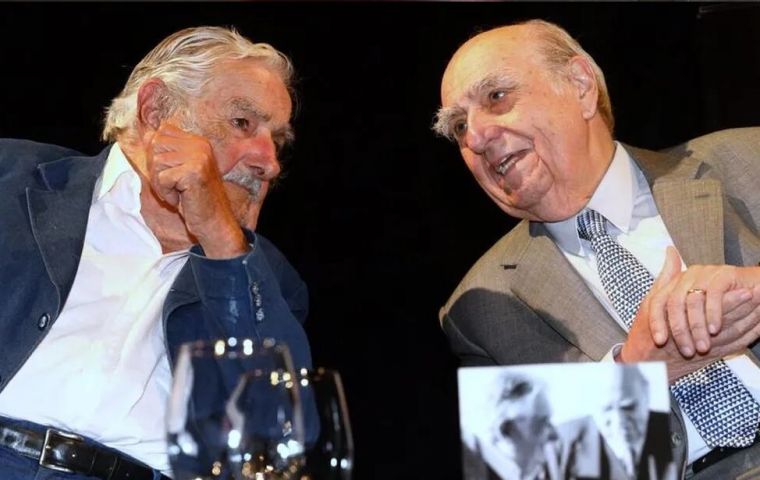MercoPress. South Atlantic News Agency
Mujica and Sanguinetti hope for a “more flexible” Mercosur
 Argentina and Brazil must understand each other for a better Mercosur, argued Sanguinetti (R) at the Aladi forum alongside Mujica
Argentina and Brazil must understand each other for a better Mercosur, argued Sanguinetti (R) at the Aladi forum alongside Mujica Former Presidents José Pepe Mujica and Julio María Sanguinetti concurred this week during their appearances at the Latin American Integration Association's (Aladi) Regional Solidarity Integration Forum in Montevideo that Latin American countries needed to “be more flexible” to tackle the problems of today's world.
The “International Forum on Regional Integration and Solidarity. Challenges of the Brasilia Consensus” also laid out a roadmap for a cooperation mechanism and joint intervention in the face of natural disasters.
“If we continue to be prisoners of consensus, we will be paralyzed. We have to be careful not to ideologize common sense and go down to concrete things that the people can feel. If we go into 'left, right, center, I like it, I don't like it, lame or one-eyed,' we are toast”, Mujica said.
In his view, “a series of things will come out of here and none of them pretends to change history, they are little bricks in a building that has to be constructed. There is a multitude of things, many of which do not even require money, but political will.”
“We would like to ask two things of the governments of the Americas: Support these institutions that already exist and have been forgotten and present [some] proposals. Decisions will be made by the executive branches,” insisted Mujica regarding the “Brasilia Consensus” in May 2023 in the Brazilian capital at the invitation of President Luiz Inácio Lula da Silva.
Mujica called on all Uruguayans not to let the flame from that event burn out while “bringing down to earth” the dreams of integration of recent years. He also underlined that “having fire departments ready to travel when a country has a disaster [was] totally possible and necessary in times of climate change.”
“Uruguay has supported in the last years the need to have a Mercosur more flexible to the world” but “unfortunately Mercosur depends on the capacity and flexibility of governments to move up,” Sanguinetti argued.
“It is essential that each one assumes that the integration process cannot be contaminated by artificial ideologies that end up carrying realities that are beyond ideologies,” he added.
“Today is not the same as before, neither the world nor America nor the cities, but we are still dragging those frontiers. We are not going to fix the world from here, but we can do a little more for our region,” the former two-time head of state pointed out.
“Today the challenge is for Argentina and Brazil to understand each other,” the Colorado leader highlighted. In its first eight years of existence, Mercosur progressed “spectacularly,” Sanguinetti argued. But then it began to fracture due to misguided ideologization and economic particularities.
He also admitted he was working with Mujica to show current political leaders what democracy is: “To show how we can and should coexist and that there are common things that should continue to unite us.”
“Unfortunately we do not have easy times in Latin America because of the internal democracies themselves and because these leaderships are not always up to what should be a responsible political project,” Sanguinetti lamented.
The Aladi was created in 1980 through the Montevideo Treaty to replace the Latin American Free Trade Association (Lafta). It is currently made up of Argentina, Bolivia, Brazil, Chile, Colombia, Cuba, Ecuador, Mexico, Panama, Paraguay, Peru, Uruguay, and Venezuela.




Top Comments
Disclaimer & comment rulesCommenting for this story is now closed.
If you have a Facebook account, become a fan and comment on our Facebook Page!